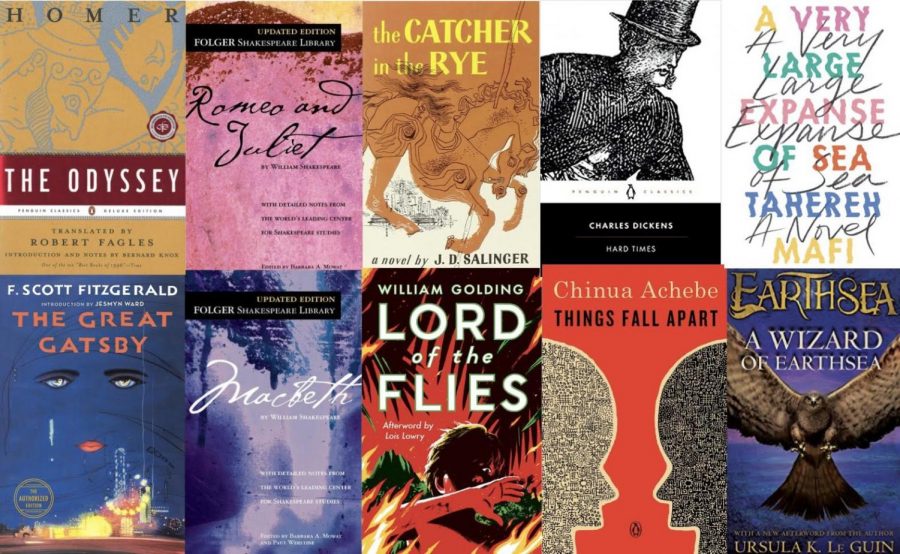How reading classics in English classes sparks enjoyment in reading
Being able to identify what makes a piece of writing good—skills acquired by reading in school—will allow for more appreciation in the finer details of literature.
Above are a few the titles that many English courses require their students to read, including classics like Romeo and Juliet and The Great Gatsby.
Just last week, I was roaming the isles of Barnes and Nobles, looking for any books that would strike me as particularly interesting. As I was trying to get to the fiction section, I briefly passed over the fantasy section with one tiny book placed directly in the center: A Wizard of Earthsea.
As I flipped through the pages, I remembered the pain of trying to read it in English class freshman year; Ursula K. Le Guin had a way of putting me to sleep whenever I would crack open the book.
For me and many others, reading in school is one of the more negative experiences we have. Oftentimes, it feels like we are being forced to read something uninteresting, then analyze, and discuss it in our classes.
One argument I hear repeated among my peers is the idea that students should be able to pick what books they read in English classes.
Yet, this would be a great folly when taking into consideration that we are here to learn, not be entertained.
I know that sounds crude, but think about it this way: just like how a math class doesn’t try to make you like geometric proofs, an English class doesn’t have to appeal to student’s interests.
You’re here to learn the basics of English: the rhetoric, the arguments, and the purposes of author’s writing. In the end, you’re learning the classics so you can enjoy other literature in the future and be able to enjoy the finer details of it.
When kids read books on their own, they read for the sake of pleasure. Oftentimes, this means reading once and moving on. On the
contrary, reading in classes reinforces the idea of review and rereading and breaking apart the motifs, patterns, and rhetoric used by the author.
These are all characteristics of critical readers; not only do students read books to apply these characteristics, but they also read essays from master essayists like Vladimir Nabokov, Scott Sanders, Flannery O’Connor, and Susan Sontag that identify what critical readers should do.
The specific texts we read, like Catcher In The Rye, The Odyssey, and The Great Gatsby (which belong to a body of literature called the Western canon), are not picked based on their entertainment value, but their quality of writing. There is indeed disagreement on how interesting the topics that authors write about are, but we can all agree that the literature they craft is good writing.
Even though English classes focus their curriculum on Western canon, their selection still represents a diverse demographic of authors and topics.
I found great enjoyment in reading books in school like Things Fall Apart by Black Nigerian author Chinua Achebe, A Very Large Expanse of Sea by Muslim author Tahereh Mafi, and The Awakening by female author Kate Chopin. It’s not all just old white men writing these books.
It may be argued that forcing students to read certain titles is not good for them in the long-term, but this doesn’t acknowledge that it prepares students for reading skills and even being forced to do things they might not want to do in the future.
Being able to take apart an author’s arguments, evidence, and purpose as well as identifying what makes a piece of literature good will translate to recreational reading as well, maximizing the enjoyment one can find in reading.
Also, it’s representative of real life: you won’t always be doing things in your life that you enjoy, so learning the work ethic is as important as the reading benefits it offers.








































